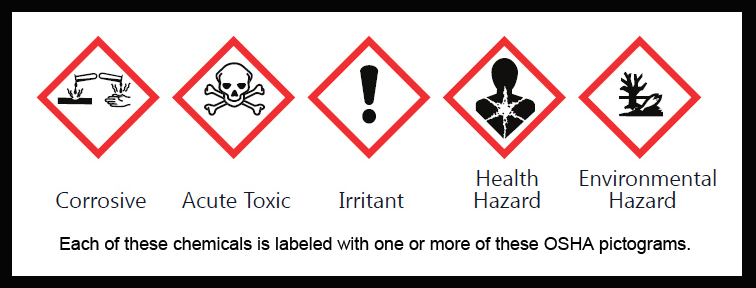Aquatic Weed Control Chemical List
- The table below gives information on the chemicals used in the treatment of weeds on Loon Lake. The information was extracted from the Manufacturer’s website and/or the Safety Data Sheet (SDS). In some cases the HAZARD information was extracted from other Internet sources and noted as such.
- Provided are:
- Chemical name
- Intended usage
- Hazards and warnings
- A link to the Safety Data Sheet (SDS)
What is a Safety Data Sheet?
The SDS is a requirement of the Hazard Communication Standard (HCS). The SDS includes information such as the properties of each chemical; the physical, health, and environmental health hazards; protective measures; and safety precautions for handling, storing, and transporting the chemical. Click on the adjacent “Warnings” picture to view SDS Requirements.

| CHEMICAL NAME | INTENDED USAGE | HAZARDS and WARNINGS | CLICK TO VIEW |
|---|---|---|---|
| Aqua Strike | A combination Aquathol K and Diquat Dibromide used as an aquatic herbicide | Toxic if swallowed. Harmful in contact with skin. Fatal if inhaled, Causes serious eye irritation. May cause respiratory irritation. Causes damage to organs through prolonged or repeated exposure. | SDS |
| Aquatic Glyphosate | A liquid non-selective herbicide | Can affect fish, invertebrates, amphibians, reptiles, birds, and mammals biochemical, physiological, endocrine, and behavioral pathways. Changes in behaviors such as foraging, escaping from predators, and courtship can compromise the survival of species and even communities. | SDS EFFECTS |
| Captain | A chelated copper formulation used to control a broad range of green and blue-green (cyanobacteria) algae, including filamentous, planktonic and macrophytic. | Harmful if swallowed Causes skin irritation Causes serious eye irritation | SDS |
| Captain XTR | A double chelated copper algaecide that uses INFUSION technology for the control of all types of algae. Optimized to increase the penetration of copper into algae cells and enhance efficacy. | Harmful if swallowed Causes skin irritation Causes serious eye irritation | SDS |
| Cygnet Plus | A non-ionic sticker, penetrant, wetter, and surfactant. It helps break down the waxy cuticle on the leaf of plants | Causes severe eye irritation, pain, discomfort, excess blinking and tear production, redness, and swelling. Ingestion: May cause abdominal discomfort, nausea, vomiting and diarrhea. Mist may cause irritation of the respiratory tract, nasal discomfort, discharge, chest pain and coughing. | SDS |
| Diquat Dibromide | A liquid non-selective contact herbicide, algicide, desiccant, and defoliant that produces desiccation and defoliation | Fatal if inhaled. Causes serious eye irritation. Harmful if swallowed. May be corrosive to metals. Very toxic to aquatic life with long lasting effects | SDS NIH |
| Natique | An aquatic copper-based herbicide that works on contact for spot and local treatment of weeds | Toxic in contact with skin. Harmful if swallowed. Causes serious eye irritation and/or irreversible eye damage. May cause allergy or asthma symptoms or breathing difficulties if inhaled. Corrosive. Very toxic to aquatic life with long lasting effects. | SDS |
| Copper Sulfate (Old Bridge) | An aquatic algaecide used for destruction of algal blooms & mollusks in water | Can cause irreversible eye damage. Can cause severe skin irritation. Harmful if swallowed or absorbed through the skin. Avoid breathing dust or mist. | SDS |
| Polyan | A sinking and drift control agent for aquatic herbicides. Used when targeting bottom growing plants with a sprayed liquid herbicide. | May cause eye irritation | SDS |
| Propeller | PROPELLER™ Aquatic Herbicide (granular) | This product is toxic to non-target plants and aquatic invertebrates with long lasting effects. Drift and runoff may be hazardous to non-target plants and aquatic organisms in neighboring areas. Harmful if inhaled. May be harmful in contact with skin. Causes eye irritation. | SDS |
| Se-Clear G | A fungicide, algaecide, root killer, & herbicide (Copper sulfate pentahydrate) | An inorganic salt that is highly soluble in water. The disassociated copper ions mainly bind to organic matter or remain dissolved in water. Researchers found that 90% of the copper was bound to sediments within minutes of application; 99% was bound after 2 days. (Source: http://npic.orst.edu/factsheets/archive/cuso4tech.html) This pesticide is toxic to fish and aquatic invertebrates. Waters treated with this product may be hazardous to aquatic organisms. Treatment of aquatic weeds and algae can result in oxygen loss from decomposition of dead algae and weeds. This oxygen loss can cause fish and invertebrate suffocation. (Source: SePro product label) | SDS |
| Tribune | A fast acting herbicide and algaecide that desiccates plant tissue on contact | May be corrosive to metals. Harmful if swallowed. Causes eye irritation. Toxic if inhaled. May cause damage to organs through prolonged or repeated exposure. | SDS |